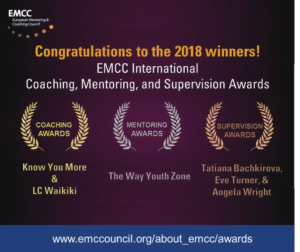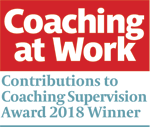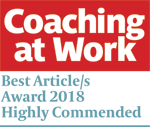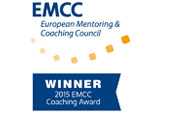24/25 July – What is the relevance of competency frameworks for our practice and society in 2025 – Damian Goldvarg (panel host) with ICF and EMCC representatives
Learn from representatives of the ICF and the EMCC on how they position coaching supervision in their associations, the new ICF Competency Framework published last year and the revised EMCC framework published in 2025. After hearing more about these frameworks participants will discuss in small groups how close or far they are in relationship to their supervision practices and interact with the associations representatives to answer any questions.
7/8 August 2025 – Colin Wilson – Supervising on Systemic Issues in a Polarised World – Part 2
In April Colin introduced this topic. By popular demand, for people who attended then, and for new participants, this session looks further at helping supervisees with their clients’ de-polarisation issues, by challenging both poles and moving to humility, empathy and intellectual honesty. Examining assumptions and outcomes of both Critical and Liberal Social Justice approaches.
Also consider where you derive your views on issues of economic policy and social affairs. This may include considerations of: Maximising the wellbeing of all, individual rights and choice, free markets, individual justice, social justice, Critical Theory and its critics, areas like climate, race, sex and gender etc.
11/12 September 2025 – Tatiana Bachkirova ‘AI coaching’ delusion: What is our role as coaching supervisors?
The coaching world continues to be flooded with AI substitutions of humans under the pretence of ‘democratizing coaching’. The views of coaching supervisors are not heard about many problematic issues with this so-called AI ‘revolution’. Coaching supervisors have an important perspective on the integrity of coaching practice, and I hope that in this conversation we can find a way to influence the coaching world in this regard within and beyond supervisory rooms.
25/26 September 2025 – Patti Stevenson – Coaching Postures
A unique, holistic sense-making framework to assist practitioners in their supervision and development – The Coaching Signatures Profile®(CSP) 2nd Edition. An introduction to the eight different coaching postures that measure the emergent relational space between coach and coachee. How they can be explored within supervision.
Small panel who use the Coaching Signatures Profile® (GSN members) to have an interactive session with attendees around ‘some gentle inward gazing upon our inner landscape’ Building on the GSN session – Adult Developmental Based Approach to Coaching Supervision in early March 2025.
23/24 October – David Lane – Ethics and culture, a negotiated boundary
The session will ask participants to consider how they conceptualise ethical decisions and how this impacts different types of supervision practice. A number of frameworks for reflection on practice will be introduced that can be used to challenge and inform our approaches to supervision in different contexts.
4/5 December – David Clutterbuck – “Supervision can’t get any more complex …..can it?”
The 10 levels of coaching complexity….An increasing function of supervision is to support coaches in helping their clients recognise and manage the complexity of the systems that surround them. We can identify ten levels of coaching complexity, each requiring a successively greater awareness of and engagement with client systems. If coaches need to be at least one step ahead of clients in terms of systems awareness, do supervisors need to be at least one step ahead of coaches? David will explore how coaches can add increased value working with teams of teams and beyond, to coaching the meta-system; and invite you to consider how you might in turn need or want to adapt your supervision practice.
10th anniversary session – celebrating the first GSN sessions held on 25/26 February 2016
26/27 February 2026 – Robin Shohet – Supervision as Spiritual Practice
Without defining spiritual, most of us in this work know there is something more than just us as separate individuals. How might this affect our work?
Previous sessions:
12/13 January 2023 – Metavision: Cultivating wisdom with Dr Henry Campion.
Henry uses the term metavision as an alternative to ‘supervision of supervision’. In his work as a metavisor, he has found the idea of cultivating wisdom to be a valuable unifying concept, a map to navigate by, both for himself and for those he works with. The aim of this session will be to offer a model of wisdom, and then reflect together on what it takes to cultivate it and how far it overlaps with metavision.
2/3 February 2023 – Embodied supervision: Restoring together a movement of life and resilience with Anne Berthelin.
At a time when current events (pandemic, war, etc.) encourage distanced contacts and relationships, people are tired and exhausted, especially we supervisors as we are accompanying others. We need to cope with the environment and hold the complexity.
Anne will share a restorative process aimed at engaging us with our whole body and restoring our movement of life and resilience, using a mix of Narrative Practices and Gestalt to reincorporate, bring to life and maybe amplify our movement of Preferred Story. Anne created this process to support her clients (patients, coachees and supervisees) as well as in organisations over the past 3 years.
23/24 March 2023 – The supervisor’s role in developing an ethical exit strategy for unexpected incapacitation and death with David Lane and Eve Turner.
Many people don’t have a personal will, so even fewer may have a professional “will” or arrangements in case of their unexpected illness or death. While this would enable a clearer process for those we leave behind reducing much of the burden, would someone know how to access our client, Facebook, LinkedIn, professional insurance, professional body memberships and other information? Using real situations where this has arisen, some information and breakouts, this session will consider a coach’s and a supervisor’s ethical obligations.
13/14 April 2023 – Join the ReCreation Party – You’re invited! with Gillian Walter
You are invited to an experiential ‘party’ where you will explore how recreation (or light & full-hearted play) and creation (hands-on creativity) can support the connection to your own best self and thinking about how to bring more ‘ReCreation’ insights into your own client sessions.
11/12 May 2023 – Taking a systemic perspective on SoS/tricky cases with Tammy Turner
This experiential session will challenge you to expand your capacity in handling tricky cases and what’s required for the future of supervision. We will look at what is required as professional supervisors to work with cases that range from the student learning individual coaching to the advanced coach working in a complex adaptive system (CAS). A dynamic new model Spiralling the field to develop reflexivity will be introduced and explored against your tricky cases.
22/23 June 2023:
Thursday – Decolonizing and Liberatory Coaching Principles Applied in Coaching Supervision – DeBorah (Sunni) Smith
The session will explore how the Coaching for Transformation’s (CFT) approach to decolonizing and liberatory coaching principles can enrich the coaching supervision experience. Interactive small group sessions will introduce and expand on an established and “lived-experience” coaching methodology for healing, justice, and liberation.
Friday – A Decolonial Take on Ethical Maturity – Charmaine Roche
This session will explore the shift required for supervision to play a meaningful role in what is emerging as a social justice orientation in coaching. It will focus in on the place of critical reflection and radical compassion as underdeveloped attributes of ethical maturity. You will gain some insight into what these concepts might mean for you as a supervisor of coaches with aspirations to make a difference in relation to climate and social justice intent.
6/7 July 2023 – Let’s fall (and fail) together – Robin Shohet
Hafiz writes:
Pulling the chair
From beneath your mind
And watching you
Fall upon God
What else is there for Hafiz to do
Which is any fun
In this world
What is it that you would least like to find out or acknowledge about yourself? That might be the way to fall upon whatever you wish to call God. You might like to watch on the BBC iPlayer (if you have access) Humza Arshad, the comedian and YouTuber talking of “Forgiving the Unforgivable” if you have time. It throws up, as does forgiveness generally, our conflicts about letting go. https://www.bbc.co.uk/iplayer/episodes/m001hhr8/humza-forgiving-the-unforgivable) or if no access read about it here: https://www.bbc.co.uk/programmes/m001hhr8 . You could also read Anita Sanchez’s beautiful book “Four Sacred Gifts,” gifts delivered by a gathering of 27 First Nations Elders. One is called: “Forgive the Unforgivable.” Anita, a coach, tells her story of the murder of her father.
31 August/1 September 2023 – Kitchen Conversations – being in dialogue with ourselves and others, with music and movement – Anna Casas and Hellen Hettinga from the GSN Subgroup “supervision and reflective practice in the face of a climate and ecological emergency”
Sparked by Jeremy Lent in his book The Web of Meaning:
“As our civilization careens toward climate breakdown, ecological destruction, and gaping inequality, people are losing their existential moorings. The dominant worldview of disconnection, which tells us we are split between mind and body, separate from each other, and at odds with the natural world, has been invalidated by modern science.”
This special edition of the Kitchen Conversations invites you to join us integrating our connection between mind and body. It will be an experiential session, being in dialogue with ourselves and others. Not through verbal language, but through our bodies’ intelligence guided by the music rhythms. Using a meditation practice in movement, without choreography, we will engage in a spontaneous movement practice following the rhythms of the music.
It is an experiment to explore knowing beyond the cognitive, discover a creative expression of our essence, so we can tap into fresh, emergent ways of knowing that integrate learning on an individual and collective level through the improvised movements. Through sensing the rhythms of the music, we develop our presence and resilience, learn to be comfortable with not-knowing and allow deeper connections. This practice will serve practitioners and their stakeholders in developing awareness and an authentic curiosity in ‘who are you?’
21/22 September 2023 – Ethics in Coaching Promotion – with Francine Campone (Thursday) and Alex van Oostveen (Friday)
This interactive session will help coaching supervisors notice potential ethical challenges in coach promotional activities and consider blind spots, cognitive biases and errors in ethical judgement in coach self-presentation.
12/13 October 2023 – Team Coaching Supervision; Same or Different? – Anna Springett and Larissa Thurlow (Thursday), Cheryl Cooper and Larissa Thurlow (Friday)
Anna, Larissa and Cheryl have partnered to invite the network to co-reflect on an important question of how to best support team coaches in supervision. How are we already equipped and what else may we need to consider in order to be fit for this role/purpose?
9/10 November 2023 – Working with Context: Listening to a new voice – Bev Paulin
Contextual perspectives are not new in human-centred and developmental theory or practices. However, the call to acknowledge and honour context seems to be growing louder, broader, and deeper across coaching and supervision. This dialogue will be open, spacious, and undoubtedly enriched by the voices and presence of those gathered. It will be an opportunity to explore contextual dynamics in practice. It is an invitation to listen to a new voice.
30 November/Friday 1 December 2023 – EXTRA SESSION Invitation Guest speaker: Elaine Patterson – Enlisting Wisdom’s Wisdom for Planet Earth
An update from the GSN subgroup Supervision and Reflective Practice in the face of a Climate and Ecological Emergency.
7/8 December 2023 – Celebrating supervision – bring your stories, chaired by Robert Stephenson
Further details to be added. This will mark the end of the GSN’s 8th year (we started at the beginning of 2016).
1/2 February – The future role of Supervision in transforming Coaching and Human Consciousness –Professor Peter Hawkins.
At the route of all of the great global challenges of our time is inability of current human consciousness to respond to the world we have created. Coaching consultancy and supervision all have a key role in the maturation of human consciousness at the individual team, organisational and partnership levels. Peter will introduce some of the key approaches from his new book ‘Beauty in Leadership and Coaching and the Transformation of Human Consciousness’.
22/23 February – What every supervisor needs to know about working with neurodivergent clients in the workplace – Dr Francoise Orlov and Professor David Clutterbuck
Neurodiversity covers a wide range of divergent forms of thinking and being. A major advancement in the past decade had been the increasing recognition that neurodivergence is a difference, not a disability. Supervisors need to be well-informed and skilled in two ways that are relevant to this emerging understanding. One is how neurotypical coaches can best work with neurodivergent clients and how those clients interact with the systems around them. The other is how neurodivergent coaches can make effective use of the difference of perspective that they bring to their practice. They will share some of the themes emerging from their research with neurodivergent coaches and supervisors internationally.
7/8 March – Creativity in Supervision PoYee Dorrian (Thursday) and Jane Cox (Friday)
These sessions are deliberately different and, staying true to the essence of creativity, the two facilitators will each take their own creative approaches to inspire creativity. The sessions are designed to be exploratory and experiential, offering the participants an opportunity to play, activate, and integrate their inherent creativity into their supervisory practice. By adapting an inside-out approach in the sessions, participants will engage in various activities that encourage self-discovery and self-expression.
11/12 April – Communities of Practice: Ecosystems Supervision Groups – Hetty Einzig and Martin Vogel
We have been convening ecosystems supervision groups since 2020 – in person and online. We focus in depth on the individual and in breadth on the systems and networks in which our supervisees and their clients are located. Our approach encourages an integration of our identities as people, practitioners and citizens.
The recent United Nations Human Development report talks of a ‘new Uncertainty Complex’ where in addition to ‘normal everyday worry’ three particular areas of concern overlap: the accelerated rise of AI and other new technologies; our rising anxieties about the climate crisis and environmental collapse; the catastrophic geo-political polarisations, not just in the Middle East and Ukraine, but within our own fracturing institutions and societies.
We work within these circumstances, they form our wider ecosystem, and the concerns they raise are shared by us and our clients alike. The accumulation of ‘outsize’ and complex problems can engender a sense of impotence, anxiety and confusion that can transfer onto our individual concerns.
Our ecosystems supervision groups reflect on the impact of these developments on ourselves, our clients and our work. They answer the need for a space to explore our thoughts and feelings in the context of the many cultural and natural ecosystems of which we are part – home, family, workplaces, communities, nation and world. The group enables us all to also challenge our conscious and unconscious norms, assumptions and behaviours.
2/3 May – Stepping out of Otherness and Supervision – Rita Symons
In this session, Rita will share some of the social psychology and themes from interviewing women of colour, and their experience of being ‘other’ (from her book “Stepping Out of Otherness” due out in 2024). We will consider how this might impact for coaches and what then we might need to consider as supervisors.
20/21 June – 2 different sessions: Thursday Show and Tell with Jeremy Lewis and Thea Bombeek; and Friday How Liberatory Coaching Principles Can Add Value to Coaching Supervision with DeBorah (Sunni) Smith
(June 20th) Show and Tell
1) Jeremy’s two research papers (published in 2023 and forthcoming in 2024) have conceptualised a framework that sets out how coaching supervisors might intentionally choose their interventions to meet their supervisees’ needs. Jeremy will present this framework and invite attendees to reflect on its potential uses in their own practice.
2) Thea: The dual process model of grief (Stroebe and Schut) is a holistic approach for coping with grief and loss. It moves away from previous grief models and theories, acknowledging individual experiences as different and unique. In this Show and Tell presentation, you will learn what the dual process model of grief is, how it works and how it can support you when accompanying bereaved clients.
The remaining time will be for others to share their own “show and tell” resources.
(June 21st) How Liberatory Coaching Principles Can Add Value to Coaching Supervision with DeBorah (Sunni) Smith
The session will explore how the Coaching for Transformation’s (CFT) approach to liberatory coaching decolonization can enrich the coaching supervision experience. Interactive small group sessions will introduce and expand on a case study that reflects a “lived experience” and coaching methodology for healing, justice, and liberation.
11/12 July – How We Learn: The Power of Predictive Processing – Henry Campion
Predictive processing is a new way of understanding how we learn. The idea is that we have an internal ‘generative model’ of the world which continuously (and mostly outside our awareness) predicts what will happen next, and the best action to take. Having taken the action, if the outcome is not as predicted – we’re surprised by what actually happens – we learn from this ‘prediction error’ by updating the generative model. This presentation explores how an understanding of predictive processing can enhance our supervision practice.
5/6 September – How far is your responsible Horizon? Let’s explore together the art of “Catedral Thinking” – Hellen Hettinga and Anna Casas
This is part of Kitchen Conversations 2024, a space of creativity, sharing, connection, being in relationship, intimacy, wisdom. We co-create a brave space to gather and to sense, reflect and dialogue together.v. These are casual conversations on topics that matter to us and are related to how we humans relate to each other, to the earth and to ourselves. Each invitation is framed around an inquiry or a topic . This session is about the relationship we have with the time horizon and the decisions we take individually and collectively in relation to it.
This Kitchen Conversations edition is inspired by the quote:
“When we build, let us think that we build forever.
Let it not be for the present delight,
not for present use alone;
Let it be such a work as our descendants will thank us for”
from John Ruskin and from the book “The Good Ancestor”, How to think long term in a short-term world, written by Roman Krznaric.
10/11 October – Will AI Make Supervisors Redundant? – David Clutterbuck and Jonathan Passmore (Thursday) and David and Lise Lewis (Friday)
This session will include an overview of current and near future developments in AI within coaching, a brief demonstration, and a lot of opportunity for dialogue. Our aim is to help you keep ahead of technological change!
14/15 November – Loyalties at work: how the loyalty towards your family of origin influences professional choices and interaction patterns – Thea Bombeek
Your family of origin is your first context. This is where you get a blueprint of the important life themes. In this webinar you will discover how underlying processes and patterns of loyalty towards your family of origin manifest in your life. Increased awareness helps you to make conscious choices when dealing with professional challenges in a more constructive way. Living more in alignment with your essence, and at the same time staying loyal to your family, will create inner peace. Furthermore the insights you gain from this webinar will help you to address these themes with your clients.
5/6 December – Planning your own CPD with Doug Montgomery
This topic uses Doug’s recent personal experiences of a different style of Continuous Professional and Personal Development. This CPPD has been undertaken as part of a group of coaches and supervisors looking beyond the standard CPD offerings. The group adopted the name: Learning on the Edge (LOTE) and has involved us organising a series of 12 events (from horse whispering to Drag artistry) over the past couple of years. At different times these events have taken each of us to the edges of our comfort and at times into discomfort. However, supported by the group we have found our own learning and learned from each other’s experiences.
Doug will use this session to briefly share LOTE and then invite discussion and reflection on what is the purpose of CPPD for supervisors? What makes it CPPD? And, how do we integrate it into our supervision practice? Some of the group may attend and may offer their personal experiences and support Doug in the discussion.
12/13 December – How We Learn: The Power of Predictive Processing – Henry Campion (a repeat from earlier in 2024 as oversubscribed)
Predictive processing is a powerful new way of understanding how we learn. The idea is that we have an internal ‘generative model’ of the world which continuously (and mostly outside our awareness) predicts what will happen next, and the best action to take. Having taken the action, if the outcome is not as predicted – we’re surprised by what actually happens – we learn from this ‘prediction error’ by updating the generative model. This presentation will explore how an understanding of predictive processing can enhance our supervision practice.
9/10 January 2025 – What are we reluctant to let go of as supervisors? – Professor Tatiana Bachkirova.
What are we reluctant to let go of as supervisors? The first response might be “Why is there any need to let go of anything, anyway? If things are not going badly, why not just carry on as usual and enjoy our practice?” However, there is more to supervision than just our three main functions and problem-solving. It is foremost a way for both supervisors and coaches to see more in our practice, including ourselves. But we carry many filters as observers, and these stay firmly embedded because we do not want to relinquish our self-importance, knowledge, status, comfort, convictions, etc. So, this conversation comes with a health-warning.
6/7 February 2025 – The Ethics of Care: Maturity and interdependence in the Coaching Profession – Hetty Einzig.
The coaching profession is growing up – forced to mature perhaps by the need for reflective, brave and accountable spaces in a turbulent world in deep trouble and for practices that can engage with the complex challenges and levels of distress our clients bring us (i). Coaching is moving on, and must move on (as David Drake also urges), from its attachment to entry-level competency-based practices through mastery to embrace maturity (ii). I contend that the Ethics of Care, a concept formulated by psychologist Carol Gilligan and developed by Virginia Held and others, offers a robust and generous framework for the mature practice of coaching and coaching supervision for our times and beyond (i). Emphasising interdependence, context, and competency founded in respect and sensitivity to the needs others, the Ethics of Care is not counterpoint to the Ethics of Justice but alongside and interdependent with fairness and equality. It proposes an ethics founded in the reality that we have all been cared for, that our lives and well being depend on caring and receiving care, and that an attitude of care towards others and our environment can profoundly shift our mindset and behaviours – as coaches, supervisors and human beings.
6/7 March 2025 – Using an Adult Developmental Based Approach in Coach Supervision – Ursula Clidière, Otto Laske.
Attendees will gain a fundamental understanding of what represents adult development (vs adult learning), basic knowledge about the two most adult developmental strands, social-emotional and cognitive development and how these are modulated by a person’s psychological profile (and vice versa). We will explore briefly what dialectical thinking is and how it can be used in supervision. As hands-on exercise, we will review an application that taps into all three domains and which participants can readily use in their own practice. If time permits, we will also look at the application of polarity management and its link to CDF and possible use in coach supervision.
27/28 March 2025 – AI and supervision: AI Unleashed: Transforming People Development and Leadership Supervision – Neil Ralph and Alex Haitoglou.
A pre-recorded podcast from Sam Isaacson is available here: https://youtu.be/lPPTPqKuSXA
The aims for the sessions are:
a) Overall AI update and understanding
b) Implications for people development, and specifically coaches’ and leader’s supervision
c) Specific examples on mentoring / supervision (I will demonstrate from real sessions that people were happy to share)
10/11 April, 2025 – Supervising on systemic issues and in a polarised world: Examining assumptions and outcomes of both Critical and Liberal Social Justice approaches – Colin Wilson.
Coaches now often advertise they offer ‘systemic’ coaching, but what does this actually mean? What does Supervising this mean in practice? – and in a polarised world of different opinions? Team and Individual coaches are often trained that systems are complex and emergent. Where do they over-simplify, and where do they fail to spot effective simplicity, where Supervisors could help? In this session, participants consider the assumptions of their supervisees and their own implicit assumptions about systems, and the likely resulting impacts and risks of their approach, using the social justice arena as an example.
24/25 April, 2025 – Collaborative hope in the eye of the storm – how do we supervisors respond to these turbulent times? – Rita Symons, Anjali Nair, Brian Lowell French, Anna Brown, Rachael Skews and Eve Turner. Hosts: Thursday and Friday: Helena Hettinga and Anna Casas (co-leads of the GSN working group “Supervision and Our Responsible Horizons”)
The GSN has become one of 13 signatories to the joint statement on ecological and climate change originally written in 2020; others include the ICF, EMCC, COMENSA, IAC, APECS and AC. This statement has been updated in 2025 along with a planned name change (currently Joint Global Statement Group). Hear more about GSN’s involvement and about the updated statement and debate our role as supervisors.
1/2 May, 2025 – Celebrating the 40th anniversary of the 7-eyed model – Professor Peter Hawkins.
In this webinar, Professor Peter Hawkins will delve into the 40-year evolution of the Seven-Eyed Model, first introduced as a paper in 1985. He will trace its journey from its initial purpose, through its collaborative development with Robin Shohet in 1989, and its adaptation for the coaching world in the 1990s, culminating in its publication with Nick Smith in a 2006 book.
Peter will also discuss the model’s more recent systemic advancements and highlight findings from recent research. Together, we’ll explore as a group how the model can continue to evolve over the next 40 years.
12/13 June – Supervision in Teams and Groups: Introducing the distinctive features of working with groups and teams online– Christine Thornton.
In this webinar, Christine will present her new chapter on virtual working and the research on which it was based, followed by conversations and shared questions and answers on most effective practice.

 GSN members include supervisors working in countries such as the USA, Canada, Brazil, Mexico, Australia, New Zealand, South Africa, Kenya, China, Hong Kong, South Korea, Vietnam, Singapore, India, Oman, Qatar and Turkey, as well as throughout Europe such as Spain, Poland, Portugal, France, Finland, Hungary, Germany, Latvia, Austria, Luxembourg, The Netherlands, Belgium, Ireland, Italy, Sweden, Switzerland and the UK. The GSN has established a community that brings together some of the leading thinkers in the field. To date there have been 260+ webinars and there are 420+ members worldwide.
GSN members include supervisors working in countries such as the USA, Canada, Brazil, Mexico, Australia, New Zealand, South Africa, Kenya, China, Hong Kong, South Korea, Vietnam, Singapore, India, Oman, Qatar and Turkey, as well as throughout Europe such as Spain, Poland, Portugal, France, Finland, Hungary, Germany, Latvia, Austria, Luxembourg, The Netherlands, Belgium, Ireland, Italy, Sweden, Switzerland and the UK. The GSN has established a community that brings together some of the leading thinkers in the field. To date there have been 260+ webinars and there are 420+ members worldwide. The Global Supervisors’ Network is proud to have partnered with EthicalCoach, the philanthropic arm of WBECS (now part of coaching.com), to support aspiring coaches in Africa with supervision. GSN supervisors have also supported CoachActivism which helps frontline refugee workers and individual volunteers.
The Global Supervisors’ Network is proud to have partnered with EthicalCoach, the philanthropic arm of WBECS (now part of coaching.com), to support aspiring coaches in Africa with supervision. GSN supervisors have also supported CoachActivism which helps frontline refugee workers and individual volunteers.

















